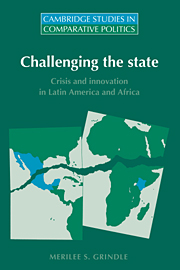Book contents
- Frontmatter
- Contents
- List of figures
- List of tables
- Acknowledgments
- 1 Challenging the state: a decade of crisis
- 2 Crisis and the state: evidence from Latin America and Africa
- 3 Crisis and breakdown in Mexico and Kenya
- 4 Imposing state authority
- 5 Managing the economy
- 6 Administering the public good
- 7 Responding to society
- 8 States of change
- Notes
- References
- Index
5 - Managing the economy
Published online by Cambridge University Press: 27 August 2009
- Frontmatter
- Contents
- List of figures
- List of tables
- Acknowledgments
- 1 Challenging the state: a decade of crisis
- 2 Crisis and the state: evidence from Latin America and Africa
- 3 Crisis and breakdown in Mexico and Kenya
- 4 Imposing state authority
- 5 Managing the economy
- 6 Administering the public good
- 7 Responding to society
- 8 States of change
- Notes
- References
- Index
Summary
Technical capacity relates centrally to the influence of science and reason in policy making, the role of ideas in the search for solutions to public problems, and the institutionalization of analytic problem solving within the public sector. Technical capacity varies among states and within states over time, and technical analysis is rarely the sole basis on which public decisions are made. Nevertheless, the ability to use scientific knowledge as an input into decision making, and into the management of public affairs, is a distinguishing characteristic of modern states. As the problems faced by modern governments have grown increasingly more complex, and as the informational and analytic bases on which to make decisions has increased, technical capacity is increasingly required to identify the origin and nature of public problems and assess possible solutions to them.
A wide range of activities carried out by the state can provide evidence of its technical capacity. A national statistics agency that is able to collect, process, analyze, and disseminate information about economic and social conditions is one example. Promoting policy-relevant research on important public health issues is another, as is the ability to build bridges and roads that meet reasonable construction and safety standards. Similarly, introducing and managing complex information systems, ensuring air traffic safety, monitoring inflation, regulating financial markets, carrying out research on new agricultural and livestock technologies, and providing for safe drugs and water supplies are all functions that imply the need for technical expertise in a variety of fields.
- Type
- Chapter
- Information
- Challenging the StateCrisis and Innovation in Latin America and Africa, pp. 109 - 126Publisher: Cambridge University PressPrint publication year: 1996

